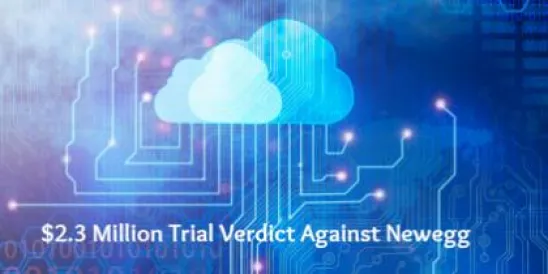On November 25, 2013, the jury in TQP Development, LLC v. 1-800-Flowers.com, et al., U.S.D.C., E.D. Tex., No. 2:11-cv-00248-JRG-RSP, returned a $2.3 million verdict for plaintiff TQP Development, LLC (“TQP”) against Newegg, Inc. (“Newegg”) in TQP’s suit for infringement of United States Patent No. 5,412,730 (the “’730 Patent”). TQP had claimed $5.1 million in damages.
The ‘730 Patent was titled “Encrypted Data Transmission System Employing Means for Randomly Altering the Encryption Keys,” was filed in 1989, and was issued in 1995. TQP acquired the patent in 2006. The patent related to secure communication through the use of pseudorandom encryption keys generated from a seed value, algorithm, and message data, which is a common method of securing customers’ privacy in online banking and commerce.
The jury found that TQP had proved by a preponderance of the evidence that Newegg had directly infringed, and induced its customers to infringe, TQP’s asserted claims of the ‘730 Patent. The jury also found that Newegg had not proved by clear and convincing evidence that TQP’s asserted claims of the ‘730 Patent were invalid.
In so doing, the jury rejected Newegg’s argument that prior art rendered TQP’s patent invalid as anticipated and obvious. Newegg presented, in particular, testimony by its expert witness Whitfield Diffie, a pioneer in public key cryptography. According to Ars Technica, in response to the question “how is it you’re familiar with public key encryption?” Mr. Diffie responded, “I invented it.” Mr. Diffie also testified as to prior art in a 1982 textbook called Cryptography and Data Security, which contained a diagram of a symmetric “closed” cryptographic system, as well as the invention of the RC4 cipher in 1987 and the combination of that with Lotus Notes shortly thereafter. TQP’s attorney attacked Mr. Diffie’s testimony by, in part, pointing out that the history website for the Institute of Electrical and Electronics Engineers (IEEE) credits the invention of public key cryptography to James Ellis at the British Government Communications Headquarters (GCHQ) in 1969.
Newegg’s decision to take the case to trial is consistent with its public stance against “patent trolling” and its resistance to settling. According to testimony before the U.S. House of Representatives Committee on Energy and Commerce on November 14, 2013 by Newegg Chief Legal Officer and Senior Vice President of Corporate Development Lee Cheng, Newegg has been sued or threatened with suit over 30 times, but has never lost a patent suit after appeal. In particular, the Federal Circuit in January 2013 reversed an Eastern District of Texas jury verdict that Newegg infringed an e-commerce “shopping cart” patent owned by non-practicing entity Soverain Software LLC and was liable for $2.5 million in damages. This TQP case, in fact, was budgeted for appeal from the start, according to Ars Technica. Other Internet technology companies, some of whom have recently launched a public patent reform campaign, may be taking note of Newegg’s patent litigation defense approach.



 />i
/>i

